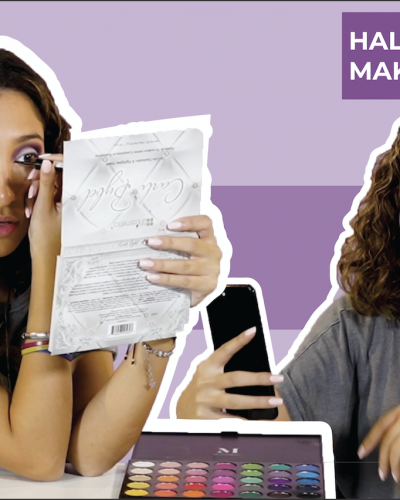You Will Defs Like these too
Life Video of The Day

Rund's Halloween Makeup TutorialOct.27.2020
New at The Modern East
Sign Up To Our Newsletter
[ninja_forms_display_form id=20]

We are based in a region in which mental health stigma is, unfortunately, tremendously prominent. For decades, individuals who have suffered with mental illness were deemed as weak or outrageous – or both. Some assumptions may go so far as to claim that an individual suffering with their mental health simply does not have strong enough faith in their belief system which consequently leads to them facing such struggles and not having the abilities to overcome them. These ideologies are commonly depicted in cultures that are practiced in the region quite often, and it has become an immense problem for those facing mental health issues.
Although, the culture is not to blame, rather, society projecting their own principles and theories onto the matter. In this article, we are delving into the importance of therapy and how to use it to better your mental health, working towards overcoming the stigma that the mental health community ever-so constantly faces in the region, as well as the development towards a better, more accepting future in our society.
Why Therapy is Important
Therapy is important for the well-being of an individual suffering with their mental health. Your mental health is, in fact, just as important as your physical health as particular mental disorders may hinder you from achieving your goals, accomplishing particular tasks, and, in severe cases, simply going about your day-to-day lives.
When partaking in therapy, a mental health professional may provide a fresh perspective on an issue that you are facing. They can give people a better understanding of their own emotions, and therapists can also teach communication skills to convey those emotions, as well as coping mechanisms to better deal with them.
Therapy can promote one’s self-esteem, relationships, and outlook on life, as well as assist in the aid, and in some cases, recovery of particular mental illnesses. From Cognitive Behavioral Therapy and exploring the relationship between a person’s feelings, thoughts, and behaviors, to more in-depth approaches like psychoanalysis and psychodynamic therapies, and more – there is a practice that tackles any problems an individual may face mentally, making therapy, not only a necessity in some cases, but a reliable option when wanting to better a person’s life over-all.
Where Does the Stigma Stem From?
In a study published by the National Library of Medicine called Perception and coping with stigma of mental illness: Arab families’ perspectives it states that “Arab families perceived the experience of caring for a family member with a mental illness with fear, loss, embarrassment, and disgrace of family reputations.” Directly affirming the prominence of the stigma in the region and further stating, “Secrecy, isolation, despair, and helplessness were reported the most among different family groups.”
One main factor to consider that greatly contributes to the stigma revolving around mental health in the MENA region is the false understanding that your mental health is not as important as your physical health. When a loved one is physically ill, people may bring them gifts, offer them as much help as possible, send them “get well soon” messages, and even have them hospitalized and pay them visits – but why is it different when a loved one is mentally unwell? Is it because they don’t show symptoms of being “sick”? Or is it because they show may show it too much and bring “shame” upon themselves or their families?
The Significance of Reputation in Arab Societies
The tribal people of our society used honor (“Sharaf”/ شرف) and reputation (“Som3a”/ سمعة) as a way of establishing rules and laws around conduct and behavior and these traditions have been carried on throughout the generations that came after. Although development has been apparent overtime and people have become more open minded and accepting of things that may have been considered “taboo” in the past, it is evident that the morals and beliefs of the ancestors of our society still have an impact on many people’s ideologies and way of thinking to this day.
To “bring shame” and damage your family’s reputation in this region is a substantial matter that directly impacts the way many may view “sensitive” topics. The topic of mental illness is no stranger to these principles as it is viewed as “incorrect,” and even “embarrassing” to the family’s name. So, what must be eliminated or changed in order for our society to recognize that having a mental illness, or even struggling with your mental health is a serious issue?
What Are We Doing Wrong?
The idea that reputation is a major aspect in terms of values in our society is not likely to change anytime soon, and with the lack of awareness toward mental health related topics being, somewhat, non-existent, how are we supposed to progress?
One of the main reasons we have not overcome the mental health taboo is our lack of education towards the matter. Until recently, there have been no resources in order to assist in mental health aid, emergencies, or education overall. Another factor that directly contributes to the taboo is the misconception that having faith in your belief system is the only way to overcome mental health issues.
Not only is it important to treat your mental health as you would your physical health, but it is also important because having a mental illness or ignoring the way you’re feeling and allowing trauma to develop into an illness, whether physical or mental, can ultimately be detrimental – and sometimes even fatal – to one’s life, whether through illness, natural death, or an individual deciding to take their own life.
Working Towards Overcoming the Stigma
That being said, prayer is a great mindfulness skill in therapy, and many have found solace and hope through their connection and faith with a higher power, but, for others, it is important for them to seek help and learn skills that will allow them to go about their daily lives and overcome any difficulties they may face. This help can be found in Cognitive Behavioral Therapy, as well as Dialectical Behavioral Therapy – depending on their diagnosis as well as other factors that play a part in their mental health instabilities and how those mental instabilities have ultimately come about.
We, as a society must also put more effort into educating the future generations to come on the matter through awareness and communication regarding mental health as a whole. Mental health has been a taboo subject for years and – most probably – many years to come. As for therapy, it is not just for mental health problems, it is also useful for things like relationship problems, difficult life events, and behavioral problems that can assist in the treatment and aid of one’s wellbeing.
Local Mental Health Resources You May Need
If you or a loved one are struggling with mental health related concerns, it is important to remember that you are not alone, and it is okay to ask for help. Right here, in the United Arab Emirates, Health authorities such as SEHA, MOHAP and The National Programme for Happiness and Wellbeing have set up several helplines that allow residents to reach out and ask for the assistance they need.
Estijaba Helpline: 8001717
The Estijasba helpline, which is operated by the Abu Dhabi Health Services Company (SEHA) and the Abu Dhabi Department of Health that provides psychological support services through SEHA’s staff members over the telephone. The helpline was setup to address psychological distress calls, including emergencies in the community, it is a free-of-cost service available six days a week, from Sunday to Friday between 8am and 6pm.
‘Speak, we’re listening’ telephone line: 045192519
Contact Ministry of Health and Prevention (MOHAP) on their hotline dedicated to respond to psychological concerns and anxiety related to the COVID-19 pandemic. ‘Speak, we’re listening’ operates from 9am to 6pm five on Mondays to Fridays, both in English and in Arabic.
UAE’s Mental Health Support Line: 8004673
The National Programme for Happiness and Wellbeing launched the Mental Health Support Line 800HOPE to provide safe and confidential mental health support to individuals.
Additionally, there are more local resources to support in terms of education as well as in-person psychological help and guidance from licensed professionals, whether you are looking for a psychiatric diagnosis, or therapy.
Aware MENA
Aware MENA is an online magazine revolving around the topic of mental health and the stigma within the MENA region through passion and experience. For more education on mental health topics, whether you are looking for general knowledge, a community, reading up further on the stigma, or looking to practice mindfulness and self-care, visit aware-ae.com.
The Lighthouse Arabia Center for Wellbeing
The LightHouse Arabia is a community mental health and wellness center providing high quality outpatient services to children, adults, couples, and families.
Vivamus
If you find yourself struggling to live the life you’d like or the life you were once leading Vivamus is here to help. The wellness center is a team of clinical psychologists assisting the expat and local community in Dubai.


Title Break
Lorem ipsum dolor sit amet consectetur adipisicing elit. Possimus incidunt ea cupiditate. Magnam atque officia fuga qui, deleniti iure quisquam rem. Unde ad ullam modi fugit non. Temporibus blanditiis perspiciatis maxime officiis magnam iure dolorem error eveniet aperiam deserunt dolore autem quos officia, aliquid eius aut necessitatibus repellendus! Fugit veritatis laudantium ipsum voluptate perferendis nisi nihil fuga sed! Cumque ipsam, pariatur ad unde cupiditate possimus tempora aliquid distinctio eum illum, temporibus aut veniam labore eveniet suscipit saepe omnis animi velit nobis magnam commodi sequi vitae nemo nostrum. Amet, nobis aut repudiandae illo debitis ducimus atque officia doloribus expedita. sint explicabo, nemo tenetur assumenda repellat expedita reprehenderit cumque! Itaque fugiat nemo dolore tenetur repellendus reiciendis, aut reprehenderit aliquid veniam quae iusto incidunt earum quam totam illum, quisquam at, voluptatibus fuga maxime nobis similique error? Iure, minus, veritatis doloremque vero earum, sint dolorem voluptate repudiandae repellat culpa numquam?
Lorem ipsum dolor sit amet consectetur adipisicing elit. Possimus incidunt ea cupiditate. Magnam atque officia fuga qui, deleniti iure quisquam rem. Unde ad ullam modi fugit non. Temporibus blanditiis perspiciatis maxime officiis magnam iure dolorem error eveniet aperiam deserunt dolore autem quos officia, aliquid eius aut necessitatibus repellendus! Fugit veritatis laudantium ipsum voluptate perferendis nisi nihil fuga sed! Cumque ipsam, pariatur ad unde cupiditate possimus tempora aliquid distinctio eum illum, temporibus aut veniam labore eveniet suscipit saepe omnis animi velit nobis magnam commodi sequi vitae nemo nostrum. Amet, nobis aut repudiandae illo debitis ducimus atque officia doloribus expedita. sint explicabo, nemo tenetur assumenda repellat expedita reprehenderit cumque! Itaque fugiat nemo dolore tenetur repellendus reiciendis, aut reprehenderit aliquid veniam quae iusto incidunt earum quam totam illum, quisquam at, voluptatibus fuga maxime nobis similique error? Iure, minus, veritatis doloremque vero earum, sint dolorem voluptate repudiandae repellat culpa numquam?

Lorem ipsum dolor sit amet consectetur adipisicing elit. Possimus incidunt ea cupiditate. Magnam atque officia fuga qui, deleniti iure quisquam rem. Unde ad ullam modi fugit non. Temporibus blanditiis perspiciatis maxime officiis magnam iure dolorem error eveniet aperiam deserunt dolore autem quos officia, aliquid eius aut necessitatibus repellendus! Fugit veritatis laudantium ipsum voluptate perferendis nisi nihil fuga sed! Cumque ipsam, pariatur ad unde cupiditate possimus tempora aliquid distinctio eum illum, temporibus aut veniam labore eveniet suscipit saepe omnis animi velit nobis magnam commodi sequi vitae nemo nostrum. Amet, nobis aut repudiandae illo debitis ducimus atque officia doloribus expedita. sint explicabo, nemo tenetur assumenda repellat expedita reprehenderit cumque! Itaque fugiat nemo dolore tenetur repellendus reiciendis, aut reprehenderit aliquid veniam quae iusto incidunt earum quam totam illum, quisquam at, voluptatibus fuga maxime nobis similique error? Iure, minus, veritatis doloremque vero earum, sint dolorem voluptate repudiandae repellat culpa numquam?
